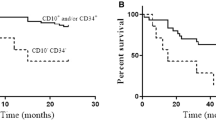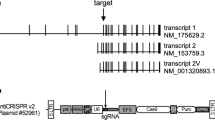Abstract
Multidrug resistance (MDR) induced by drug efflux has been identified as the major clinical obstacle in the treatment of childhood acute lymphoblastic leukemia (ALL). To explore the possible effects of midkine (MK) gene on the chemotherapeutic drugs efflux, we examined the MK gene expression in 139 B-lineage ALL patients and 15 children with nonmalignant hematological diseases. Meanwhile, we detected the degree of drug accumulation in 30 progressing B-lineage ALL patients and the 15 control individuals (as control). The results showed that the significant statistic difference in MK gene expression was found among the normal group, the complete remission (CR), and progressing B-lineage ALL patients (p < 0.01). In the Rhodamine 123 (Rh123) efflux test, mean fluorescence intensity (MFI) in the leukemia cells was obviously lower than that in normal pre-B cells (p < 0.01). Furthermore, there was an evident negative correlation between the MFI and MK mRNA expression (r = −0.869, p < 0.001) but no correlation with the MDR1 mRNA expression (p > 0.05). We concluded that there was powerful drug efflux ability in lymphoblastic leukemia cells with high MK gene expression. MK gene may take part in multidrug resistance.





Similar content being viewed by others
References
Ho MM, Hogge DE, Ling V. MDR1 and BCRP1 expression in leukemic progenitors correlates with chemotherapy response in acute myeloid leukemia. Exp Hematol. 2008;36:433–42.
Ikematsu S, Yano A, Aridome K, et al. Serum midkine levels are increased in patients with various types of carcinomas. Br J Cancer. 2000;83:701–6.
Hidaka H, Yagasaki H, Takahashi Y, et al. Increased midkine gene expression in childhood B-precursor acute lymphoblastic leukemia. Leuk Res. 2007;31:1045–51.
Kadomatsu K. The midkine family in cancer, inflammation and neural development. Nagoya J Med Sci. 2005;67:71–82.
Takei Y, Kadomatsu K, Matsuo S, et al. Antisense oligodeoxynucleotide targeted to Midkine, a heparin-binding growth factor, suppresses tumorigenicity of mouse rectal carcinoma cells. Cancer Res. 2001;61:8486–91.
Qi M, Ikematsu S, Ichihara-Tanaka K, Sakuma S, Muramatsu T, Kadomatsu K. Midkine rescues Wilms’ tumor cells from cisplatin-induced apoptosis: regulation of bcl-2 expression by midkine. J Biochem. 2000;127:269–77.
Gottesman MM, Ling V. The molecular basis of multidrug resistance in cancer: the early years of P-glycoprotein research. FEBS Lett. 2006;580:998–1009.
Kim R, Tanabe K, Uchida Y, Emi M, Inoue H, Toge T. Current status of the molecular mechanisms of anticancer drug-induced apoptosis. The contribution of molecular-level analysis to cancer chemotherapy. Cancer Chemother Pharmacol. 2002;50:343–52.
Tsuruo T, Naito M, Tomida A, et al. Molecular targeting therapy of cancer: drug resistance, apoptosis and survival signal. Cancer Sci. 2003;94:15–21.
Ohuchida T, Okamoto K, Akahane K, et al. Midkine protects hepatocellular carcinoma cells against TRAIL-mediated apoptosis through down-regulation of caspase-3 activity. Cancer. 2004;l00:2430–6.
Sandra F, Harada H, Nakamura N, Ohishi M. Midkine induced growth of ameloblastoma through MAPK and Akt pathways. Oral Oncol. 2004;40:274–80.
Mirkin BL, Clark S, Zheng X, et al. Identification of midkine as a mediator for intercellular transfer of drug resistance. Oncogene. 2005;24:4965–74.
Feldhahn N, Rio P, Soh BN, et al. Deficiency of Bruton’s tyrosine kinase in B cell precursor leukemia cells. Proc Natl Acad Sci USA. 2005;102:13266–71.
Huang Y, Anderle P, Bussey KJ, et al. Membrane transporters and channels: role of the transportome in cancer chemosensitivity and chemoresistance. Cancer Res. 2004;64:4294–301.
Muramatsu T. Midkine and pleiotrophin: two related proteins involved in development, survival, inflammation and tumorigenesis. J Biochem. 2002;132:359–71.
Stoica GE, Kuo A, Powers C, et al. Midkine binds to anaplastic lymphoma kinase (ALK) and acts as a growth factor for different cell types. J Biol Chem. 2002;277:35990–8.
Sakaguchi N, Muramatsu H, Ichihara-Tanaka K. Receptor-type protein tyrosine phosphatase zeta as a component of the signaling receptor complex for midkine-dependent survival of embryonic neurons. Neurosci Res. 2003;45:219–24.
Kang HC, Kim IJ, Park JH, et al. Identification of genes with differential expression in acquired drug-resistant gastric cancer cells using high-density oligonucleotide microarrays. Clin Cancer Res. 2004;10:272–84.
Acknowledgments
This study was supported by a grant from the Natural Science Key Program of Science and Technology Commission Foundation of Tianjin of China (nos. 08JCZDJC19100 and 09JCZDJC17300), and the Ph.D. Programs Foundation of Ministry of Education of China (no. 20091106110038).
Author information
Authors and Affiliations
Corresponding author
Additional information
R. Hu and Y. Yan contributed equally to this work.
About this article
Cite this article
Hu, R., Yan, Y., Li, Q. et al. Increased drug efflux along with midkine gene high expression in childhood B-lineage acute lymphoblastic leukemia cells. Int J Hematol 92, 105–110 (2010). https://doi.org/10.1007/s12185-010-0613-x
Received:
Revised:
Accepted:
Published:
Issue Date:
DOI: https://doi.org/10.1007/s12185-010-0613-x




